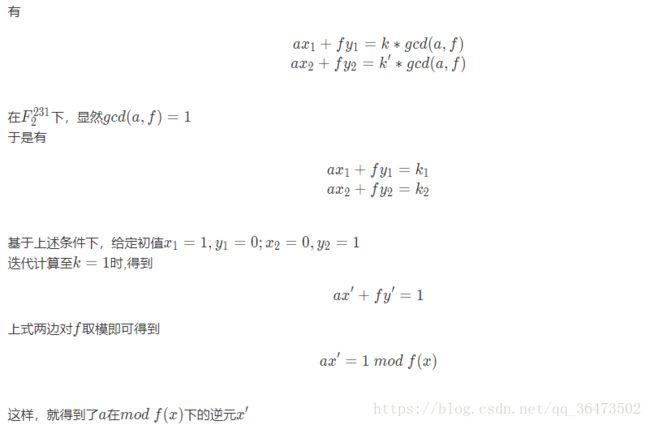F(2^131)下有限域基本运算的实现(c++)
有限域实验
实验目标
实现![]() 上的基本运算,并计算学号的逆元
上的基本运算,并计算学号的逆元
不可约多项式为![]()
算法原理
加法
在![]() 下,对于定义在该域上的任意多项式
下,对于定义在该域上的任意多项式 ,由于
,由于![]() 只能取0或1,可将g(x)用长度为131的比特串来表示。
只能取0或1,可将g(x)用长度为131的比特串来表示。
对于这样的多项式,加法和减法实际上是等价的,均为异或操作。(同次项系数相同则二者抵消为0,不同则保留为1的项)
取模
模运算建立在等式 ![]() 的基础上
的基础上
由上述加法法则可以得到 ![]()
记![]()
假设x^j是一个高次项,那么可由下面的过程将其降次(图中省略了mod f(x))
经过这样的运算后,![]() 从高次项变成了低次项。
从高次项变成了低次项。
那么对于需要取模的多项式,只要对其的每一个高次项进行这种运算,再将结果求和,就能得到取模后的结果
乘法
对于要进行乘法运算的两个多项式
由分配律可知
对于多项式a(x),将其乘以一个![]() 等价于将其比特串左移i位。
等价于将其比特串左移i位。
故算法可表示为
input:a(x),b(x)
output:c(x)=a(x)*b(x) mod f(x)
c=0
for i in (0,m):
if b[i]==1:
c ^= temp << i;
return c mod f(x)
平方
求逆
由拓展欧几里得算法,对任意多项式a(x)和不可约多项式f(x),以下简写为a,f
具体迭代过程为
x1=1;y1=0;
x2=0;y2=1;
k1=a;k2=f;
while deg(k1)!=0:
j=deg(k1)-deg(k2)
if j <0:
swap(k1,k2)
swap(x1,x2)
j=-j;
k1=k1+(k2<实验结果
Convert 16336163 to bits:
00000000000000000000000000000000000000000000000000000000000000000000000000000000000000000000000000000000000111110010100100100001011
16337163's inverse is:
10010010100000111011101011101101100010101100010000110100100110110001100001101110000111010101101110010100111010110010110111100011101
The product of "16337163"and its inverse is:
00000000000000000000000000000000000000000000000000000000000000000000000000000000000000000000000000000000000000000000000000000000001
具体代码实现
程序基于c++的bitset实现。
p为不可约多项式,r为p去掉最高次的余式
加法
bitset add(const bitset &a, const bitset &b)
{
bitset ans = a ^ b;
return ans;
}
取模
bitset mod(const bitset<2 * M> &a, const bitset &r)
{
bitset<2 * M> x, y;
bitset<2 * M> extend_r(r.to_string());
x = a;
y ^= bitset<2 * M>(x.to_string().substr(M)); //取比特串的低M位
while (judge(x)) //judge函数功能:判断多项式的高M位是否存在1
{
y.reset();
y ^= bitset<2 * M>(x.to_string().substr(M));
for (int i = M; i < 2 * M; i++)
if (x[i])
y ^= extend_r << (i - M);
x = y;
}
return bitset(y.to_string().substr(M));
}
乘法
bitset multiply(const bitset &a, const bitset &b, const bitset &r)
{
bitset<2 * M> x;
bitset<2 * M> temp(a.to_string());
for (int i = 0; i < M; i++)
{
if (b[i])
x ^= temp << i;
}
return mod(x, r);
}
平方
bitset square(const bitset &a, const bitset &r)
{
bitset<2 * M> x;
for (int i = 0; i < M; i++)
x[i * 2] = a[i];
return mod(x, r);
}
求逆
bitset inverse(const bitset &a, const bitset &p)
{
bitset<2 * M> b, c, u, v, temp;
bitset r(p.to_string().substr(1));
int j;
b[0] = 1;
u = bitset<2 * M>(a.to_string());
v = bitset<2 * M>(p.to_string());
while (degree(u))
{
j = degree(u) - degree(v);
if (j < 0)
{
j = -j;
temp = u;
u = v;
v = temp;
temp = b;
b = c;
c = temp;
}
u = u ^ (v << j);
b = b ^ (c << j);
}
return mod(b, r);
} code.cpp
#include
#include
#include
#include
#include
using namespace std;
#define M 131
int degree(const bitset<2 * M> &a)
{
for (int i = 2 * M - 1; i >= 0; i--)
if (a[i] || i == 0)
return i;
}
bool judge(const bitset<2 * M> &a)
{
bitset temp;
bitset<2 * M> t(temp.set().to_string() + temp.to_string());
t &= a;
return t.any();
}
bitset add(const bitset &a, const bitset &b)
{
bitset ans = a ^ b;
return ans;
}
bitset mod(const bitset<2 * M> &a, const bitset &r)
{
bitset<2 * M> x, y;
bitset<2 * M> extend_r(r.to_string());
x = a;
y ^= bitset<2 * M>(x.to_string().substr(M));
while (judge(x))
{
y.reset();
y ^= bitset<2 * M>(x.to_string().substr(M));
for (int i = M; i < 2 * M; i++)
if (x[i])
y ^= extend_r << (i - M);
x = y;
}
return bitset(y.to_string().substr(M));
}
bitset multiply(const bitset &a, const bitset &b, const bitset &r)
{
bitset<2 * M> x;
bitset<2 * M> temp(a.to_string());
for (int i = 0; i < M; i++)
{
if (b[i])
x ^= temp << i;
}
return mod(x, r);
}
bitset square(const bitset &a, const bitset &r)
{
bitset<2 * M> x;
for (int i = 0; i < M; i++)
x[i * 2] = a[i];
return mod(x, r);
}
bitset inverse(const bitset &a, const bitset &p)
{
bitset<2 * M> b, c, u, v, temp;
bitset r(p.to_string().substr(1));
int j;
b[0] = 1;
u = bitset<2 * M>(a.to_string());
v = bitset<2 * M>(p.to_string());
while (degree(u))
{
j = degree(u) - degree(v);
if (j < 0)
{
j = -j;
temp = u;
u = v;
v = temp;
temp = b;
b = c;
c = temp;
}
u = u ^ (v << j);
b = b ^ (c << j);
}
return mod(b, r);
}
int main()
{
bitset p("111");
p[131] = 1;
p[13] = 1;
bitset r("111");
r[13] = 1;
bitset id(16337163);
cout << "Convert 16336163 to bits:" << endl
<< id << endl
<< "16337163's inverse is:" << endl
<< inverse(id, p) << endl
<< "The product of \"16337163\"and its inverse is:" << endl
<< multiply(inverse(id, p), id, r) << endl;
}

